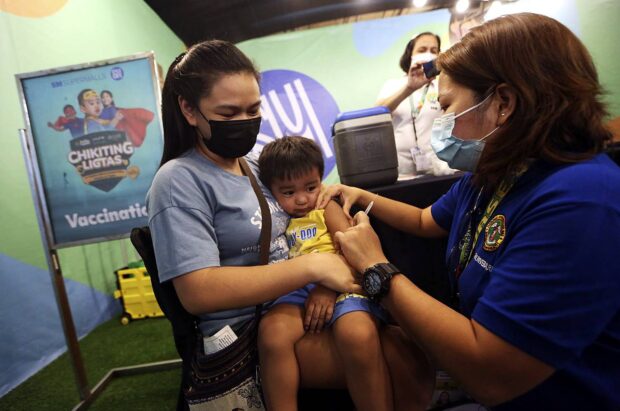
A child receives measles-rubella and oral polio vaccines during the launching of the Chikiting Ligtas Supplemental Immunization Activity, at the SM City Marikina in Marikina City, May 2, 2023. Dubbed as “Chikiting Ligtas sa dagdag bakuna kontra Polio.” (File photo by NIÑO JESUS ORBETA / Philippine Daily Inquirer)
MANILA, Philippines — The Department of Health (DOH) has received a grant worth CA$3.4 million (P145.5 million) from the Canadian government as part of a partnership with the United Nations Children’s Fund (Unicef) to boost routine immunization of Filipino children and integrate it with COVID-19 vaccination.
The donation came just as the World Health Organization (WHO) earlier warned that Western Pacific countries, including the Philippines, are at risk of measles outbreaks due to immunization and surveillance gaps.
Health Secretary Teodoro Herbosa, Canadian Ambassador to the Philippines David Hartman, and Unicef Representative to the Philippines Oyunsaikhan Dendevnorov reiterated their commitments to this joint endeavor during the partnership’s launch on Tuesday.
According to the DOH, the project would prioritize provinces and municipalities with the highest number of children who have not had a single shot of childhood vaccines and with the greatest number of unvaccinated individuals for COVID-19 booster vaccines.
Selected towns
These areas include select municipalities in the provinces of Antique, Davao Del Norte, and Sarangani; General Santos City; and the Special Geographic Area in the Bangsamoro Autonomous Region in Muslim Mindanao.
“The collaboration uses a gender-responsive approach that seeks to address particular needs and barriers, including the socioeconomic, cultural, and developmental disparities between men and women and that ensures equitable access to vaccines and has proven effective in strengthening a health system so that it can deliver quality, inclusive and affordable primary health care for all,” the DOH, Unicef and Canadian government said in a joint statement.
READ: Canada set to finance over $5 billion worth of climate-related deals in PH
Based on the latest DOH data, only 637,000 Filipino children aged five and below with childhood vaccines have been fully immunized, equivalent to 60 percent coverage, which was far from the ideal vaccine coverage of 95 percent.
According to the DOH, there are still millions of Filipino children with zero or incomplete vaccination who are still at risk of outbreaks of deadly diseases, such as measles and polio.
Mandatory shots
Under Republic Act No. 10152, or the Mandatory Infants and Children Health Immunization Act of 2011, the mandatory and free immunization for all infants and children up to 5 years old shall cover the following vaccine-preventable diseases: tuberculosis; diphtheria, tetanus and pertussis; poliomyelitis; measles; mumps; rubella or German measles; hepatitis B; H. influenza type B (HIB); and other diseases determined by the DOH chief.
In a statement on Saturday, the WHO Western Pacific warned of “a threat of measles resurgence in the region in 2024 to 2025,” caused by the decline in the vaccine coverage during the COVID-19 pandemic, as well as the ongoing measles outbreak in the Philippines and the persistent endemic measles transmission in Malaysia.
According to WHO, the number of measles cases in the region went up by 255 percent, up from 1,422 cases in 2022 to 5,044 cases in 2023.
The largest measles outbreak happened in 2019, with almost 48,000 cases recorded, of which 632 died. The outbreak was attributed to lower vaccination rates among children, allegedly caused by the controversy surrounding the Dengvaxia dengue vaccine.